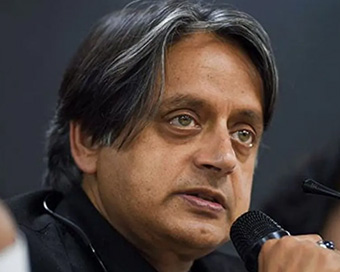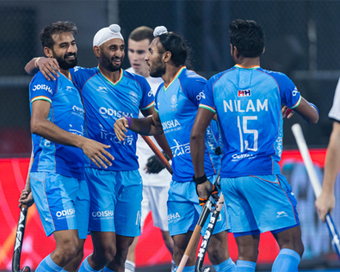Gallery
 PM Modi visit USA
PM Modi visit USA Only the mirror in my washroom and phone gallery see the crazy me : Sara Khan
Only the mirror in my washroom and phone gallery see the crazy me : Sara Khan Karnataka rain fury: Photos of flooded streets, uprooted trees
Karnataka rain fury: Photos of flooded streets, uprooted trees Cannes 2022: Deepika Padukone stuns at the French Riviera in Sabyasachi outfit
Cannes 2022: Deepika Padukone stuns at the French Riviera in Sabyasachi outfit Ranbir Kapoor And Alia Bhatt's Wedding Pics - Sealed With A Kiss
Ranbir Kapoor And Alia Bhatt's Wedding Pics - Sealed With A Kiss Oscars 2022: Every Academy Award Winner
Oscars 2022: Every Academy Award Winner Shane Warne (1969-2022): Australian cricket legend's life in pictures
Shane Warne (1969-2022): Australian cricket legend's life in pictures Photos: What Russia's invasion of Ukraine looks like on the ground
Photos: What Russia's invasion of Ukraine looks like on the ground Lata Mangeshkar (1929-2022): A pictorial tribute to the 'Nightingale of India'
Lata Mangeshkar (1929-2022): A pictorial tribute to the 'Nightingale of India' PM Modi unveils 216-feet tall Statue of Equality in Hyderabad (PHOTOS)
PM Modi unveils 216-feet tall Statue of Equality in Hyderabad (PHOTOS)Hockey India has announced a 54-member core probable squad for the upcoming senior men’s
- Satwik-Chirag return as BAI names 14-strong squad for BWF Sudirman Cup Finals 2025
- Men’s Sr Hockey Nationals to be played in division-based format from April 4
- Mensik denies Djokovic 100th title in Miami final
- KIPG: Son of a vegetable vendor, Bihar’s Jhandu Kumar eyes Worlds, 2028 Paralympics
- Hardik Singh credits hard work and team unity for receiving HI Midfielder of the Year award
Universities must be an ideal version of Democracy: Shashi Tharoor Last Updated : 22 Jul 2021 03:28:26 PM IST 
"In a democratic society, universities must evolve into spaces where an ideal version of democracy is allowed to thrive. In other words, our universities must become the staging grounds for experiments in developing the most principled version of our democratic ethos. And by extension, a microcosm of what our democratic society one day could be," said Shashi Tharoor, Member of Parliament.
"We cannot reach these ideals if we do not actively strive to ensure that our campuses are inclusive and representative. No democratic model can sustain itself if it does not carve out spaces for all voices, no matter how big or small to be heard. This cannot merely be rectified through instruments like affirmative action, and need-based scholarship programmes, but through a commitment to really taking a stock of the barriers to access, and inclusion, that permeates all levels of our society," he said.Tharoor was delivering the Distinguished Public Lecture at the World Universities Summit 2021 on "Universities of the Future: Building Institutional Resilience, Social Responsibility and Community Impact" organised by O.P. Jindal Global University.During his lecture, he highlighted, "The widespread transmission of the Covid-19 virus and the corresponding impact of the ongoing pandemic has spared no segment of our communities. The present pandemic has also posed a series of existential questions and formidable challenges to universities across the world. Even as more of the planet gets vaccinated, it is fair to recognise that the current set of complexities which universities are grappling with mark a watershed moment."The future of our universities must be rooted in developing generational leaders, that is more ready to deal with the national and global order, a world where multiple realities can coexist, where alternative worldviews and convictions have to be encouraged and negotiated with, and where students are taught to look beyond themselves, and their immediate surroundings, to the reality of interdependence and peaceful coexistence," Dr Tharoor further added.He said, "It is vital that our universities, therefore, be courageous enough, to remain as free and open spaces, where dissent and multiple worldviews are welcomed and cherished, for their complexity and diversity."He further outlined that the future of our universities, indeed of our higher education system, lies in striking a careful balance between utilitarian needs, that our technical educations provide, and the broader liberal arts system that will help our graduates expand their horizons and cultivate their intellectual sensibilities.Dr. Tharoor pointed out that a study recently predicted that 30 per cent jobs in the world in 2030 will be those that do not exist today! He went on to say, "How can you educate young people for jobs that don't exist? Our traditional utilitarian approach in India has been to shove facts into the students from school and college onwards, make them memorise stuff and then regurgitate it in the examinations. Today, we can get facts off the Internet, but we need individuals who can react to unfamiliar facts, who can discover new information, who can understand new information."Tharoor also delved deeply into the issue of employability which is connected to the quality of higher education. He said, "Meeting the forces of markets demands research, the pursuit of usable knowledge, and the imperative of building an equitable society. We are suffering from a systemic problem of skill mismatch, with respect to qualifications and job opportunities. The image of India has changed from that of a backward, developing country to a sophisticated land, which produces doctors, engineers and computer experts. The education sector needs to keep up with the world!"C. Raj Kumar, Founding Vice-Chancellor of O.P. Jindal Global University (JGU) said, "Dr. Tharoor is a leading public intellectual, author, scholar and Member of Parliament of India. We are grateful and honoured to have him at the World Education Summit and to benefit from his global knowledge and learning especially in these extraordinary times when the entire world is facing a global pandemic. As a leading author and scholar, his views on higher education will influence and impact the discourse and provide valuable insight based on his wide, international experience."The 1st Keynote Session had a Keynote Address on 'Vision for International collaboration in Higher Education: Building a Better, Fairer World' delivered by Dr. Joanna Newman, Secretary General, Association of Commonwealth Universities, followed by a Presidential Address delivered by Professor (Dr.) Pankaj Mittal, Secretary General, Association of Indian Universities.Over 30 themes related to Universities and Higher Education across the world are being discussed at this summit. Some of the sessions were held on the following subjects: On a Road to Equity: University Support System to Promote Diversity & Inclusion in Higher Education; Minding the Gap: Rethinking Curriculum, Pedagogy & Assessment amid the Covid-19 Disruption; Virtualizing Mobility: Innovations for Internationalisation of Higher Education and Paradigm Shift: Role of Technology in Strengthening the Universities of the Future.Other sessions will include academic luminaries such as Professor (Dr.) Siv Pam Fredman, President, International Association of Universities; Dr. M.K. Sridhar, Member, Central Advisory Board of Education, Ministry of Education, Government of India; Ms. Sahana Singh, Author and Columnist; Professor (Dr.) Dinesh Singh, Former Vice Chancellor, University of Delhi.This summit will also see senior leadership from multiple National, Regional and International organizations including Professor (Dr.) Uttam Gaulee, President, Society for Transnational Academic Research (STAR) Network, Mr. Phil Baty, Chief Knowledge Officer, Times Higher Education (THE), Mr. Ben Sowter, Senior Vice President, Quacquarelli Symonds (QS), Dr. Lynn Pasquerella, President, Association of American Universities and Colleges, Dr. George R. Boggs, President and CEO Emeritus, American Association of Community Colleges, Dr. Nina Arnhold, Global Lead for Tertiary Education, World Bank.The three-day virtual event with global leaders of higher education will help to reimagine the 'Universities of the Future' and strengthen their vision and commitment towards institutional resilience, social responsibility and community impact.IANS Sonipat For Latest Updates Please-
Join us on
Follow us on








172.31.16.186







